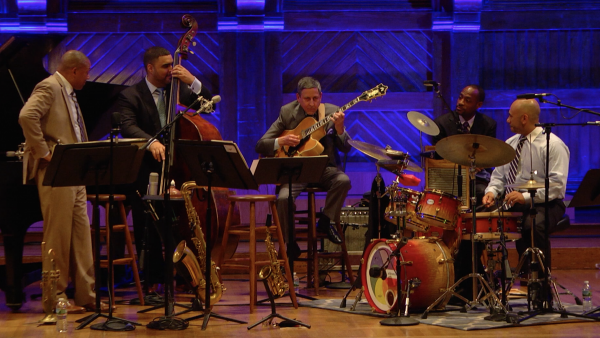Jazz Mogul Wynton Marsalis: Sing Your Own Song, But Don’t Forget About That Swing
After finishing his lecture-performance at the Pulitzer Centennial Celebration at Harvard University on Saturday, jazz musician and educator Wynton Marsalis imparted a piece of wisdom to me: the Internet is not shortening our attention spans.
“It’s not about the Internet—it’s about the cultivation of taste and of reflection, about communities sitting in reflection,” insisted Marsalis, who won a Pulitzer Prize in 1997 for his three-and-a-half-hour jazz oratorio Blood on the Fields. ”When I was growing up, long before the Internet came along, our attention spans were no different. We still didn’t want to sit down and listen to some two-hour piece of music. In fact, the Internet should be making things better, because it allows us to reflect and interface with a wider, more accessible amount of information.”
While many contemporaries in the music industry seem to cling onto the Internet as a negative disruptor to their craft—stealing already-dwindling money, compromising integrity, distracting otherwise loyal customers—Marsalis claims that these are the wrong questions to ask about music. Instead, the 54-year-old advocates for music’s timeless role as a cultural change agent and community-builder, liberated from its ultimately ephemeral distribution channels.
The theme of the Pulitzer Centennial, hosted by the Nieman Foundation for Journalism at Harvard, was “Power: Accountability and Abuse,” examining perceptions and manifestations of power at the familial, national and global levels. Marsalis opened the celebration on Saturday night, while Pulitzer Prize winners ranging from Washington Post reporter Wesley Lowery to author Junot Díaz and playwright Lynn Nottage told their stories and read excerpts from their own classic works on Sunday.
Marsalis’ placement as the opener reinforced his position as one of the most influential figures in the world of jazz. As the Managing & Artistic Director of Jazz at Lincoln Center, a multimillion-dollar institution that recently underwent an $18.5 million redesign, he has a stronghold in shaping the music tastes of New York City’s wealthy elite. He is also one of over a dozen black board members at the organization, driving the push for executive diversity and pointing to an emerging wealthy class in urban African-American communities.
Yet, as far as Marsalis presents himself, he doesn’t want you to think about money, wealth or tech. During his Pulitzer Centennial concert, he focused instead on the art of storytelling, the importance of meaning and the balance between individuality and universality for which all artists strive.
Many of his axioms were opposite, yet complementary. One minute, he praised improvisational individualism—”you can’t join the throne until you sing your own song”—and the next minute, he was diving into the importance of swing as a collective, unifying beat that evens out such individualistic tendencies. ”Don’t forget to pursue that swing—the ‘we’ that balances the ‘i’ of improvisation,” he quipped. “Us jazz musicians, we always end up arguing and fighting about how we can best come together.”
Moreover, Marsalis’ definition of good storytelling is about nuanced meaning, not about volume. “Words might be a good way to communicate, but music is the most intravenous, in that both the external and internal life of characters can be developed separately,” he explained. “Since there are so many layers, the louder your music shouts, the less we hear. You can’t communicate making all kinds of racket!”
In fact, all of these concepts do relate to money, especially in today’s increasingly noisy music world: listeners will dedicate their ears and wallets to you if you can tell a compelling, multilayered narrative that both highlights your own personality and resonates with wider moral and cultural fundamentals. Marsalis claims, however, that these challenges and priorities are not unique to 21st-century artists. For someone with such a profound understanding of the present, Marsalis also has a deep respect for history.
“Very little is unique to our time,” he told me backstage. “We think it’s unique because we don’t understand how life was before us, and those who did live through that time want to give off the illusion that it was better than today.” His didactic words certainly apply to the current commercial climate in the music industry: many older executives remain nostalgic about the golden age of record labels in the 90s, without comfortably accepting streaming or refocusing on music’s larger cultural significance, which remains strong even in its digitization.
Hence, swing—that “we” to the “i” of improvisation—is not just about keeping a jazz ensemble together, but also about recognizing and capitalizing on the common cultural and musical threads that transcend time, technology and geography. “The ultimate purpose and value of our mythology and our arts is to determine a mutual agenda,” Marsalis declared. “This is a thriving system you can plug into, if you’re willing to be a part of it.”
by Cherie Hu
Source: Forbes


